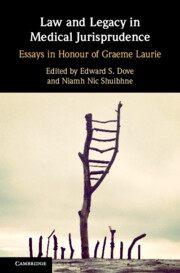Book contents
- Law and Legacy in Medical Jurisprudence
- Law and Legacy in Medical Jurisprudence
- Copyright page
- Contents
- Contributors
- Foreword
- Preface
- Table of Cases
- Table of Legislation
- Abbreviations
- Introduction
- 1 ‘Doing’ Medical Law and Ethics
- 2 A Philosopher Looks at ‘Law and Medical Ethics’
- 3 Thinking Outside the Box
- 4 The Public Interest in Health Research
- 5 Taking the Legacy Forward
- 6 On the Importance of Impact on Policy and Legacy
- 7 Breathing Life into Law
- 8 Biomedical Research Policy
- 9 The Burden of History
- 10 Body Parts and Baleful Stars?
- 11 The Legacy of the Warnock Report
- 12 ‘Only Time Will Tell’
- 13 Integrating the Biological and the Technological
- 14 UK Biobank and the Legal Regulation of Genetic Research
- 15 Overcoming Regulatory Impasse in Stem Cell Research and Advanced Therapy Medicines in Argentina through Shared Norms and Values
- 16 Institutions, Interpretive Communities and Legacy in Decision-Making
- 17 Towards a New Privacy
- 18 A Tale of Two Legacies
- Afterword
- Index
12 - ‘Only Time Will Tell’
Escape from the Medically Assisted Suicide Spiral
Published online by Cambridge University Press: 23 December 2021
- Law and Legacy in Medical Jurisprudence
- Law and Legacy in Medical Jurisprudence
- Copyright page
- Contents
- Contributors
- Foreword
- Preface
- Table of Cases
- Table of Legislation
- Abbreviations
- Introduction
- 1 ‘Doing’ Medical Law and Ethics
- 2 A Philosopher Looks at ‘Law and Medical Ethics’
- 3 Thinking Outside the Box
- 4 The Public Interest in Health Research
- 5 Taking the Legacy Forward
- 6 On the Importance of Impact on Policy and Legacy
- 7 Breathing Life into Law
- 8 Biomedical Research Policy
- 9 The Burden of History
- 10 Body Parts and Baleful Stars?
- 11 The Legacy of the Warnock Report
- 12 ‘Only Time Will Tell’
- 13 Integrating the Biological and the Technological
- 14 UK Biobank and the Legal Regulation of Genetic Research
- 15 Overcoming Regulatory Impasse in Stem Cell Research and Advanced Therapy Medicines in Argentina through Shared Norms and Values
- 16 Institutions, Interpretive Communities and Legacy in Decision-Making
- 17 Towards a New Privacy
- 18 A Tale of Two Legacies
- Afterword
- Index
Summary
UK law on assisted suicide is stuck in a cycle: courts uphold its illegality and defer to parliaments to enact change, but parliaments are reluctant to cross that threshold. This chapter deconstructs the case law on maintaining the status quo and constitutionally deferring to the legislature. It also considers reasons why legislators have declined to enact legal reform – autonomy issues, safeguards, palliative alternatives and the slippery slope. It looks at three jurisdictions in which this matter is overtly constitutional, and finds similarities among the criminal provisions that litigants sought to overturn and the rights on the basis of which they were overturned, leading to legislative change. The contested criminal provisions reflect the Suicide Act 1961 and the constitutional provisions against which they were considered to mirror the Human Rights Act. Currently, the only evidence of escape from liminality is a de facto policy of non-prosecution. With the UK Supreme Court poised to declare incompatibility with the European Convention on Human Rights, the ground has been laid for a constitutional answer that forces the legislature’s hand and enables a move beyond liminality.
Keywords
- Type
- Chapter
- Information
- Law and Legacy in Medical JurisprudenceEssays in Honour of Graeme Laurie, pp. 250 - 278Publisher: Cambridge University PressPrint publication year: 2022

